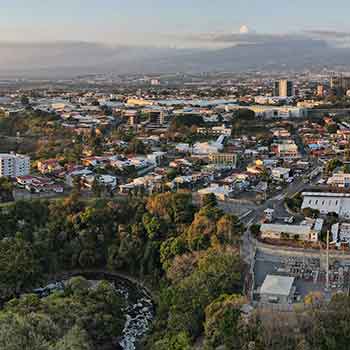HIS 3290 Costa Rican Economic and Human Development
Medical Spanish & Health Sciences Program
San Jose, Costa Rica
Dates: 9/29/18 - 12/22/18

HIS 3290 Costa Rican Economic and Human Development
OVERVIEW
CEA CAPA Partner Institution: Veritas University
Location: San José, Costa Rica
Primary Subject Area: Economics
Other Subject Area: History
Instruction in: English
Transcript Source: TBD
Course Details: Level 300
Recommended Semester Credits: 3
Contact Hours: 48
DESCRIPTION
Economic History of Costa Rica applies economics to history and history to economics. The methods of economics are used to explore historical issues, and historical examples are used to understand the process of economic development. Within this framework, the course will pursue three goals. First, it will make you better aware of the historical dynamics that propelled the contemporary Costa Rica to its present position. Second, it will illustrate how the main body of economic knowledge can be enriched by the study of history using Costa Rica as an example. Third, it will highlight the importance of markets in the allocation of society's resources throughout history and in present day Costa Rica. Indeed, there are many problems in the economics of Costa Rica for which history is the only true source of data.
This course covers the Economic History of Costa Rica, its underdevelopment, its dependence, and its struggle for development from the Pre-Columbian period to today. The course focuses on the causes of economic underdevelopment, and the economic forces shaping social institutions in various periods. It is concerned with the long-run development of the economy of this country and with analyzing economic growth and various problems, situations, and controversies that have occurred over time in the Costa Rican economy.
This course is an applied economic theory course; it is an economics course concerned with history and not a history course concerned with economics. This means that the historical problems and variables are analyzed using economic theory.
OBJECTIVES
1. To emphasize the importance of history in understanding current Latin American economic phenomena.
2. To discuss the specific aspects of the Costa Rican economy from a historical perspective.
3. To understand Costa Rica?s underdevelopment and dependence in terms of global economics and from a historical perspective.
4. To understand the economic forces shaping Costa Rica's main social institutions.
5. To introduce and discuss the limitations of the economic development paths adopted and followed by Costa Rica.
6. To analyze the impact of Costa Rica?s economic development models from varying perspectives (economic, social and environmental).
7. To emphasize the importance of the social, cultural, political and environmental influences and contexts for understanding the current Costa Rican economic situation.
Areas to be covered:
*Pre-Columbian and colonial times in Central American and Costa Rica.
*The development of export-led economies. (Coffee and bananas).
*Economic slumps.The Great Depression and the World Wars.
*The weakening of the oligarch: Civil War and the emergence of a new middle/ business class.
*The Welfare State and the Golden Years.
*The 1980s Economic Crisis.
*Debt and Structural Adjustment Policy.
*The impacts of economic development: environmental and social.
*Sustainable Development and the economic importance of Nature Tourism.
*Free Trade and the Future.
This course covers the Economic History of Costa Rica, its underdevelopment, its dependence, and its struggle for development from the Pre-Columbian period to today. The course focuses on the causes of economic underdevelopment, and the economic forces shaping social institutions in various periods. It is concerned with the long-run development of the economy of this country and with analyzing economic growth and various problems, situations, and controversies that have occurred over time in the Costa Rican economy.
This course is an applied economic theory course; it is an economics course concerned with history and not a history course concerned with economics. This means that the historical problems and variables are analyzed using economic theory.
OBJECTIVES
1. To emphasize the importance of history in understanding current Latin American economic phenomena.
2. To discuss the specific aspects of the Costa Rican economy from a historical perspective.
3. To understand Costa Rica?s underdevelopment and dependence in terms of global economics and from a historical perspective.
4. To understand the economic forces shaping Costa Rica's main social institutions.
5. To introduce and discuss the limitations of the economic development paths adopted and followed by Costa Rica.
6. To analyze the impact of Costa Rica?s economic development models from varying perspectives (economic, social and environmental).
7. To emphasize the importance of the social, cultural, political and environmental influences and contexts for understanding the current Costa Rican economic situation.
Areas to be covered:
*Pre-Columbian and colonial times in Central American and Costa Rica.
*The development of export-led economies. (Coffee and bananas).
*Economic slumps.The Great Depression and the World Wars.
*The weakening of the oligarch: Civil War and the emergence of a new middle/ business class.
*The Welfare State and the Golden Years.
*The 1980s Economic Crisis.
*Debt and Structural Adjustment Policy.
*The impacts of economic development: environmental and social.
*Sustainable Development and the economic importance of Nature Tourism.
*Free Trade and the Future.







